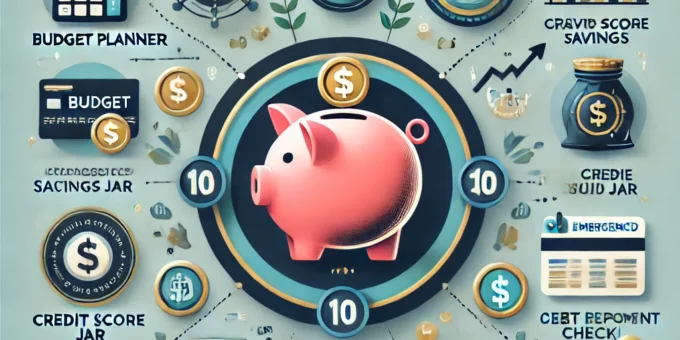
Managing your personal finances effectively is crucial for long-term financial security and peace of mind. Whether you are looking to save more, reduce debt, or invest wisely, adopting the right strategies can help you achieve your financial goals. These 10 essential tips will guide you in improving your personal finance, ensuring a stable and secure financial future.
Understand Your Financial Situation
Before making any financial decisions, you need a clear understanding of your income, expenses, assets, and liabilities. Track your income sources, analyze your monthly expenses, and assess your net worth. This will give you a solid foundation for making informed financial choices.
Create a Realistic Budget
A budget is a powerful tool for managing your money effectively. Allocate your income to essential categories such as housing, utilities, food, transportation, savings, and entertainment. Following the 50/30/20 rule—50% for needs, 30% for wants, and 20% for savings and debt repayment—can help you maintain financial stability.
Set Financial Goals
Define short-term, mid-term, and long-term financial goals. Whether it’s saving for an emergency fund, purchasing a home, or retiring comfortably, having clear objectives helps you stay focused and disciplined in managing your money.
Build an Emergency Fund
An emergency fund provides financial security during unexpected situations such as medical emergencies, job loss, or car repairs. Aim to save at least three to six months’ worth of living expenses in an easily accessible account.
Reduce and Manage Debt Wisely
High-interest debt, such as credit card balances, can quickly become a financial burden. Prioritize paying off high-interest debts first while making minimum payments on other obligations. Consider the snowball or avalanche method to accelerate debt repayment.
Save and Invest for the Future
Saving money is essential, but investing allows your wealth to grow over time. Contribute to retirement accounts, such as a 401(k) or IRA, and explore other investment options like stocks, bonds, and mutual funds to build wealth.
Improve Your Credit Score
A good credit score is crucial for securing loans, renting apartments, and even getting better insurance rates. Pay your bills on time, maintain a low credit utilization ratio, and avoid unnecessary credit inquiries to improve your credit score.
Cut Unnecessary Expenses
Review your spending habits and identify areas where you can cut back. Cancel unused subscriptions, cook at home instead of eating out, and compare service providers for better deals. Small savings add up over time, improving your financial situation.
Increase Your Income
Boosting your income can provide greater financial flexibility. Consider side gigs, freelancing, or investing in skills that can lead to higher-paying job opportunities. Diversifying income streams can enhance financial stability.
Stay Educated About Personal Finance
Financial literacy is key to making informed decisions. Read books, follow finance blogs, and stay updated on economic trends. The more you know, the better you can manage your finances effectively.
FAQs
Why is budgeting important for personal finance?
Budgeting helps you control your spending, save more, and achieve your financial goals by allocating resources effectively.
How much should I save in an emergency fund?
Aim for three to six months’ worth of living expenses to cover unexpected financial emergencies.
What is the best way to pay off debt?
Using the avalanche method (paying off high-interest debt first) or the snowball method (paying off smaller debts first for motivation) can be effective strategies.
How can I increase my savings?
Automate your savings, cut unnecessary expenses, and look for ways to increase your income to boost your savings.
Is investing necessary for financial growth?
Yes, investing allows your money to grow over time, helping you achieve long-term financial goals such as retirement.
How can I improve my credit score?
Pay your bills on time, reduce your credit utilization, and avoid excessive credit applications to maintain a good credit score.
Improving your personal finance requires discipline, knowledge, and consistency. By following these essential tips, you can build a solid financial foundation, reduce stress, and achieve financial freedom.
